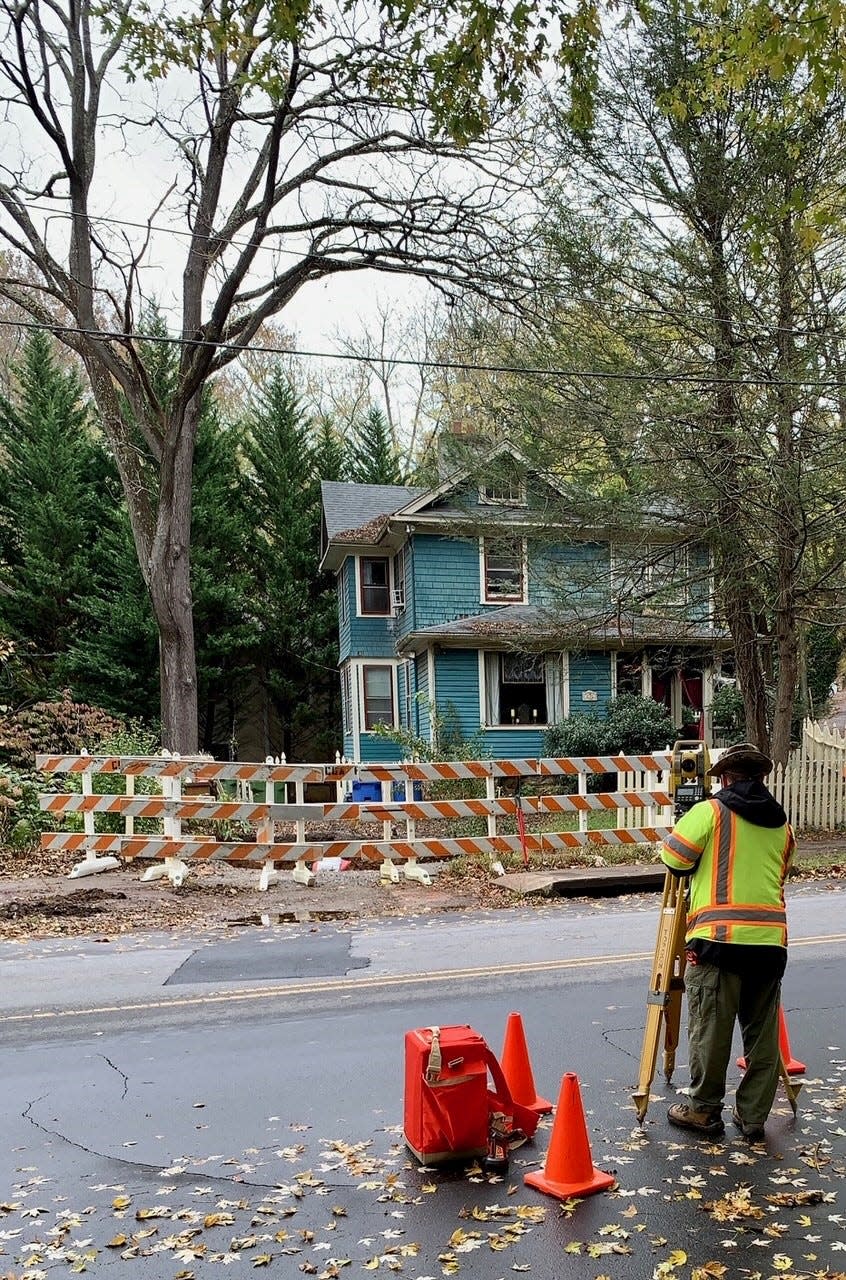Labor market still in throes of 'talent war,' and 'effective minimum wage' now $15-$18

ASHEVILLE - With the lowest employment rate in the state — 3.4% — and thousands of jobs going unfilled, the regional job market remains a tough nut to crack for employers, who just can't find enough workers.
But for the workers, it's a great time to be looking.
"We are seeing significant wage increases, and while that is helpful for recruitment/retention, there really isn’t a silver bullet for employers to find the workers they need," Nathan Ramsey, director of the Mountain Area Workforce Development Board, said via email. "We now have many employers offering starting wages at $20 per hour and above."
More: Asheville labor force reaches pre-COVID numbers, openings still outnumber job seekers
Ramsey argues that the effective minimum wage is around $15-$18 per hour "for most any job. Employers who are trying to hire at wages below that are facing an almost impossible task," he said.
Marco Lacagnina, owner of Marco's Centreville Luncheonette in Woodfin, agrees. He's got just three employees now, all making above the living wage — $17.70 an hour, or $35,450 a year, according to Just Economics WNC, which uses local rents to determine the pay rate. The actual federal minimum wage, which has remained stagnant for 12 years, is $7.25 an hour.
A 'non-response' from job candidates
Lacagnina said they're adequately staffed, but he has occasionally put up a want ad for an additional employee to help with busy times.
The response? Crickets.
"We have advertised to get a little extra help here, and I've never seen such a non-response," Lacagnina said. "No response — and even when people do respond, you try to set up an interview and they wouldn’t show up."
Ramsey said the mountain area has record numbers of people in the labor force, as well as the number of people working and the number of jobs available in the metro.
June data from the North Carolina Department of Commerce shows the four-county region (Buncombe, Henderson, Madison and Transylvania counties) had 12,856 job openings, and 7,591 people who were unemployed. That's 5,265 more openings that unemployed folks.
As the Citizen Times reported in July, 10 mountain area counties will need 22,000-45,000 new employees by 2025.
"It seems like health care, education and government are probably struggling the most, but every employer is having a difficult time," Ramsey said. "We were understaffed in health care prior to the pandemic, and health care is one of the sectors locally which hasn’t returned to the pre-pandemic peak employment."
More: Report: Asheville ranked among midsize metros building the most homes; where does it fall?
The N.C. Commerce Department data showed job openings for June in these categories for the four-county region:
• Registered nurses: 1,573
• Stockers and order fillers: 217
• Retail sales: 216
• Cashiers: 191
• Licensed practical and vocational nurses: 159
• First-line supervisors of retail sales workers: 140
• Butchers and meat cutters: 133

The government and education sectors also have struggled and haven't returned to pre-pandemic peak employment, said Ramsey, who is also the executive director of Land of Sky Regional Council, a multicounty, local government planning and development organization. These sectors aren't as nimble when it comes to raising wages, and Ramsey has seen his organization struggle somewhat to retain employees, despite a strong 7% raise their board approved.
"But we have recently lost our two highest-paid employees in our organization who have assumed similar roles at an adjoining council of government, and many other employees have been recruited by other employers," Ramsey said. "If our board had not adopted such a large salary increase, I believe we would have lost many more employees."
More: Pratt & Whitney opening: Boost for local manufacturing; alive and well
His greatest worry — and it's one Ramsey believes he shares with most employers — is retention and recruitment of staff.
"We are literally in a 'war for talent,'" Ramsey said.
In other sectors, the demand for truck drivers is "still off the charts," he added, and "distribution/logistics employers are still actively hiring. Leisure and hospitality sector is also below pre-pandemic employment levels," Ramsey said.
Sweetening the pot
At Givens Estates, which operates four senior living communities that make up Givens Communities, the company has had to be a little more nimble to keep employees, and that included pay increases.
"We have had to offer several mid-year market adjustments to remain competitive for certain positions, in addition to making a mid-year PTO policy change,” Christian Grunder, vice president of human resources with Givens Communities, said via email, referring to paid time off. "At one point we had a significant number of open positions, but since then that has improved by 37%. Most of our vacancies are for front-facing positions that interact the most with our residents: dining servers, Certified Nursing Aides, housekeepers and cooks."
“We also have had a lot of positions that in previous years haven’t typically turned over, begin to turn over,” Grunder continued. “I believe this is due to the nature of the job market and other employers drastically raising wages."
With its main campus in Arden on 72 acres, Givens typically has about 550 staff overall, with a normal number of openings in the past hovering around 30.
In early 2022, Givens Communities had 62 openings at one point, Christian said, noting Givens' reputation as a good place to work "helped bring that number down fairly quickly."
Givens also added a "talent acquisition specialist" position to help with hiring and interviews to take the pressure off directors that "often don't have time to reach out to candidates as quickly as is needed," Grunder added.
Givens was also one of almost 90 local employers who participated in the "Work/Life Balance Job Fair" in mid-August. Cumulatively, the employers represented had over 4,000 job openings paying $19 an hour or more, according to Ramsey.
"The attendance was just over 200 job seekers, which was a decline from the 340-plus people who attended the June 29 '$19 per hour and beyond Job Fair,'" Ramsey said, noting that the region remains in a "new normal" for the job market. "Prior to the pandemic, even with very low unemployment rates, it was easier for employers to hire, but it still wasn’t easy back then)."
Ramsey said they never "had less than 1,000 people attend the region’s largest hiring event, the WNC Career Expo," offered in spring and fall in partnership with the Asheville Chamber of Commerce and Mountain Area Workforce Development Board.
No end in sight
Looking ahead, the economy has cooled some, with an ongoing mild recession. Though some experts argue over whether we are in a recession, the country had two successive quarters of negative growth, a common definition for recession.
Interest rates also have continued to rise, and that makes borrowing more expensive, which is supposed to cool the housing market and general consumer spending.
But Ramsey sees no end in sight to the dearth of employees and outsized demand for their talents.
"Right now, nationally we have over twice the number of job openings as those unemployed," Ramsey said. "We have also yet to see an increase in claims for unemployment."
More: Labor crisis 'a hurricane, tornado and earthquake rolled into one,' workforce expert says
No one knows for sure if the Federal Reserve can engineer a so-called "soft landing," Ramsey noted, referring to lowering inflation without bringing on a recession.
Also, demographics come into the play with the labor market.
"Birth rates are declining and at 100-year lows, (the) Baby Boom generation is retiring at unprecedented rates, deaths from suicide/substance use disorders are at record highs, etc., so that doesn’t bode well for a future where there is an ample supply of workers," Ramsey said. "I would be very surprised if the economy slows down so much that we see a substantial spike in unemployment."

At Lacagnina's restaurant in Woodfin, he says one thing he's learned in 30 years in the restaurant industry is "you have to roll with the punches." Especially in the Asheville region, which is notorious for high rents and soaring home costs, he knows he has to pay employees well to keep them.
Lacagnina is fortunate that his luncheonette had a strong takeout model to get through the pandemic, but he's never seen conditions like the past two years, particularly the labor market.
"These last two years, they've been the toughest years I've seen here, and as far as across the country, around the world," said Lacagnina, who previously ran the independent Marco's Pizza restaurant with family.
No one could foresee the recession brought on by the pandemic, Ramsey said, but we undoubtedly will experience more cyclical economic declines.
More: Welcome to Asheville: Highest cost of living in North Carolina, but with low wages
"For employers, I would tell them to prepare for long-term tight labor markets, so act accordingly," Ramsey said. "For individuals, I would encourage them to increase their education and skills as much as possible, as we know those with the most education/skills are most prepared to respond to economic turbulence."
That doesn't mean everyone needs a degree. Ramsey points out that just about all the trades are hiring and paying very strong wages.
But those jobs often require some education or training beyond high school, whether it's a two-year community college degree or a certification in a particular field.
"Right now is a perfect time to do this, as North Carolina community colleges are more accessible than ever, (and) many local colleges are promoting free college programs," Ramsey said, noting that a lot of employers will help you pay your way through school. "Many employers are starting registered apprenticeship programs that formalize an earn and learn model."
This article originally appeared on Asheville Citizen Times: Labor market still in a 'talent war,' no 'silver bullet' on horizon

